Why Concrete Should Be Your Building Material of Choice
Choosing the right building material is crucial for ensuring the safety, durability, and aesthetic appeal of any structure. Concrete, as a leading option in construction, offers an array of benefits that position it as a superior choice. Its unmatched strength, adaptability in design, energy efficiency, environmental benefits, cost-effectiveness, and contribution to safety make it an ideal material for various projects. Concrete's versatility facilitates a vast range of applications, ensuring it can meet diverse design and structural needs. Working with concrete contractors can ensure the needed work is done efficiently and safely.
Strength and Durability
Concrete is renowned for its exceptional strength, making it indispensable for structures that demand robust support. Capable of handling immense loads without cracking, it’s the go-to material for foundations, bridges, and high-rise buildings. Its durability also extends to weather resistance — rain, snow, and wind have little impact on properly built concrete. This resilience ensures longevity, often exceeding a 100 years with proper maintenance, according to Perma Pier, far outlasting many other materials. Because it resists water damage, concrete is ideal for dams, levees, and other projects requiring watertight integrity.
Engineers also value its seismic performance: when reinforced with steel, concrete can absorb and dissipate earthquake energy, protecting lives and property. As a non-combustible material, it adds a layer of fire resistance, further enhancing safety. Beyond structural advantages, its low maintenance requirements save time and costs over its lifetime.
Whether for simple residential use or complex infrastructure, concrete consistently provides reliability, stability, and peace of mind, reinforcing its role as the backbone of modern construction.
Versatility in Design
One of concrete’s greatest strengths lies in its adaptability. It can be molded into nearly any shape, size, or texture, enabling architects and builders to execute bold and creative visions. From curved facades and sweeping arches to sleek, minimalist slabs, concrete supports both traditional and modern aesthetics. It can also be tinted, stamped, or textured by concrete contractors to mimic other materials like stone or brick, offering beauty without sacrificing strength.
Indoors, it appears in countertops, floors, and walls, while outdoors it dominates driveways, patios, and landscaping features. Concrete’s compatibility with steel, glass, and wood expands its range, producing striking designs that blend functionality with artistry.
Beyond its aesthetic qualities, innovations like ultra-high-performance concrete and 3D printing are redefining what’s possible, enabling thinner, lighter, and more efficient structures. This combination of strength and creativity ensures that concrete remains at the forefront of architectural design. Its ability to serve both practical and decorative purposes makes it an unmatched material for nearly every type of project.
Energy Efficiency
Concrete contributes significantly to energy efficiency thanks to its thermal mass. By absorbing heat during the day and releasing it at night, it naturally regulates indoor temperatures, lowering dependence on HVAC systems. This feature reduces heating and cooling costs while improving comfort in climates with wide temperature fluctuations.
When paired with modern insulation methods, concrete walls and floors further enhance efficiency, keeping spaces warmer in winter and cooler in summer. Reflective concrete surfaces and cool roof technologies also help reduce heat absorption, minimizing cooling needs in hot climates. These qualities translate into lower utility bills and long-term savings for homeowners and businesses alike.
Additionally, concrete plays a key role in meeting sustainability standards such as LEED certification, as its energy performance aligns with eco-friendly building practices. With rising energy costs and growing emphasis on green construction, concrete’s efficiency makes it a smart choice for developers. Its ability to combine durability with energy savings ensures both financial and environmental benefits for homeowners, business owners, and concrete contractors.
Environmental Benefits
Concrete is increasingly recognized for its environmental advantages. Many of its raw materials, such as aggregates, can be locally sourced, cutting transportation emissions and supporting regional economies. At the end of its life cycle, concrete can be crushed and reused by concrete contractors in new projects, reducing landfill waste and conserving natural resources.
The industry continues to innovate with eco-friendly practices, such as using fly ash, slag, and other industrial byproducts to replace portions of cement, lowering carbon emissions. Light-colored concrete surfaces also help combat the urban heat island effect by reflecting sunlight, which keeps cities cooler and reduces air conditioning demand.
In addition, recycling and sustainable mix designs align with circular economy principles, ensuring that older materials are repurposed rather than discarded. Together, these practices demonstrate how concrete contributes to greener construction. With its balance of performance and eco-friendliness, concrete proves to be not only strong and versatile but also a responsible choice for meeting the sustainability goals of modern cities and communities.
Cost-Effectiveness
While some building materials may seem cheaper initially, concrete’s longevity and resilience make it the more cost-effective option over time. Its average lifespan of up to 100 years, according to Perma Pier, means fewer replacements and lower repair expenses compared to materials requiring constant upkeep. Insurance savings may also apply, as concrete’s durability and fire resistance reduce risks and premiums.
The widespread availability of ingredients like cement and aggregates ensures stable pricing and reliable supply chains, keeping costs manageable across regions. Concrete also adapts to different budget levels, offering options in mix designs and finishes that allow flexibility without compromising quality. These factors make it practical for projects ranging from affordable housing to high-end developments.
When considering lifecycle expenses, concrete stands out for its ability to deliver lasting value, protecting investments while minimizing future costs. Ultimately, its strength, availability, and resilience ensure that concrete remains one of the most financially sound building materials available today.
Safety and Health
Beyond strength and efficiency, concrete enhances safety and wellbeing for concrete contractors and consumers. Its non-combustible nature makes it highly fire-resistant, protecting structures and giving occupants more time during emergencies. Concrete also contributes to healthier indoor environments, as it doesn’t emit harmful volatile organic compounds and serves as a barrier against allergens and outdoor pollutants.
Moisture resistance reduces mold and mildew growth, protecting respiratory health, while its solid composition deters pests like termites and rodents, preventing costly damage. Additionally, concrete provides excellent soundproofing by absorbing and blocking noise, making it especially valuable in urban areas and multi-family housing. These qualities ensure a safer, quieter, and healthier living or working environment.
The combination of fire protection, air quality benefits, pest resistance, and acoustic performance positions concrete as much more than just a structural material. It actively enhances quality of life, ensuring that buildings not only stand strong but also foster comfort, safety, and long-term wellbeing for their occupants.
Considering the extensive benefits of concrete, it firmly stands as a leading building material for modern construction projects. Its strength, durability, and longevity provide a robust foundation for various architectural endeavors. Added advantages like design versatility, energy efficiency, and environmental benefits further consolidate its appeal. From financial savings to enhanced safety, concrete offers a comprehensive package unmatched by competing materials.
Given these attributes, builders, architects, homeowners, and developers should undoubtedly consider concrete as a preferred choice in future projects. Whether you are planning a new home, renovating an existing property, or constructing large-scale infrastructure, concrete delivers lasting results you can rely on. Reach out to the concrete contractors at Kohler Concrete today to learn more about why concrete is the best option for your next building project!







Share On: